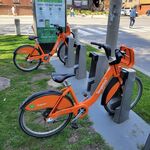wild goose chase
Active Member
It's been discussed that even though people compare him to other right-wingers or populists such as Trump, a key difference is that unlike many other right-wing politicians in Canada or the US, Ford won his support among visible minorities and included many areas of Toronto that were considered the most diverse. That is something that I think is rare.
Most right-wing populist parties, politicians or movements such as Trump's base, the Tea Party, UKIP and some examples of populist European parties along those lines alienate rather than attract the country's minorities.
Are there any other examples apart from "Ford Nation" (in Canada, the US or elsewhere in the world) where a politician that is considered right wing "populist" is strongly backed by a diverse coalition of racial/ethnic/cultural minorities, either locally, regionally or nationally, rather than just the ethnic majority?
Most right-wing populist parties, politicians or movements such as Trump's base, the Tea Party, UKIP and some examples of populist European parties along those lines alienate rather than attract the country's minorities.
Are there any other examples apart from "Ford Nation" (in Canada, the US or elsewhere in the world) where a politician that is considered right wing "populist" is strongly backed by a diverse coalition of racial/ethnic/cultural minorities, either locally, regionally or nationally, rather than just the ethnic majority?




